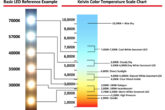When it comes to lighting systems, some of the most important variables are lumen and watt. Although most people confuse the two, lumen is not the same as watt.
What Is Lumen?
Lumen is a unit of luminous flux used to measure the quantity of visible light emitted by a source. You can also use lumen to compare the brightness in different light sources.
What is Watt?
A watt is used to measure the rate at which energy is used or produced. It helps you indicate the rate at which your appliance or devices consume electrical energy.
How to Choose Lighting System based on Lumen and Wattage
There are several factors you should consider when choosing the right lighting systems. Here is how lumen vs watt determine your choice for best lighting systems:
· Energy Efficiency
Light such as LED bulbs help to save energy in that they lower the wattage used. While at the same time providing the desired lumens, which helps to save your electricity bills.
· Purpose of your Space
Different spaces such as the kitchen, living room, bathroom, and bedrooms require different types of lighting.
For instance, your kitchen will require more lumens compared to the bedroom which will require fewer lumens.
More information: Wattage for outdoor lights.
· Room Size
Room size plays a major role in choosing the best lighting for your room based on watt and lumens.
For example, larger room size requires more lumens to help ensure even illumination while smaller rooms only need fewer lumens.
Your different room sizes require different levels of brightness thus their lumens and watts differ.
Also take a look at: LED boat lights and LED Bedroom Ceiling Lights.
· Color Temperature
You should choose a color temperature either between warm white and cool white depending on the mood you want to create in each room.
This plays a major role in the lumen and watt being used.
· Lighting Distribution
Light distribution of your light has a great impact on your lumens and watts. For instance, directional lighting requires few lumens since light is focused in one particular direction.
While diffuse lighting where light is spread evenly requires more lumens.
· Type of Light Fixtures
Your light fixtures should be made for a specific bulb type to ensure the lumens and watts match what your fixture can handle.
Also check: Flood light fixture.
Key Comparison between Lumen and Watts
· Purpose
The main purpose of lumens is to rate the brightness or intensity of your light. It helps you understand or know how light is extracted from the light source.
While on the other hand watt’s main purpose is to evaluate or estimate your energy consumption. This helps you gauge the cost of running your lights.
· Measurement Focus
Mostly lumens aim at your light output. This helps you to measure how much light is being emitted from the source.
Watt usually aims at your energy input. It helps measure the amount of electrical power needed to run your light source.
· Impact on Cost
When there are higher lumens it will lead to brighter light while on the other hand, higher wattage leads to higher energy bills.
· Performance Consideration
Both lumens and watts are considered in the evaluation of the performance of your light source.
Lumen vs Watt – What is the Difference?
Here are some of the differences between lumen and watt as mentioned below.
1. Impact on Lighting Choices
When it comes to lighting choices both lumens and watts play a major role.
An example includes; lumens help you to determine how bright a light source will be. It helps you choose the right lighting for your space.
While watts help you decide or determine how much energy your light source consumes which affects its cost and energy efficiency.
2. Comparative Measures
Lumens give you a choice to compare the brightness of two different bulbs while watts helps you to compare the power consumption of two different bulbs.
3. Energy Efficiency
When you are measuring the efficiency of lumens is usually measured as lumens per watt. It helps show you the ratio of how a light source converts power into light.
On the other hand, watt does not measure efficiency but it indicates the amount of your power. You can also learn more on: High wattage bulb.
Conclusion
In short, lumens help you to get the desired brightness you want while watts help you to see how energy efficient your bulb is.
But more importantly, several factors will help you choose the right lighting in your space based on lumens and watts as we have discussed above.

